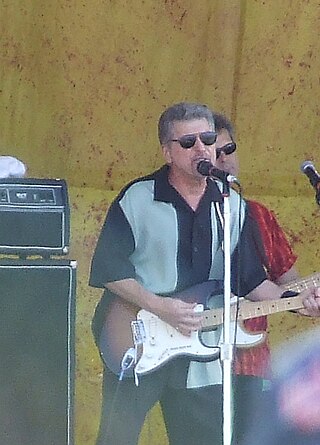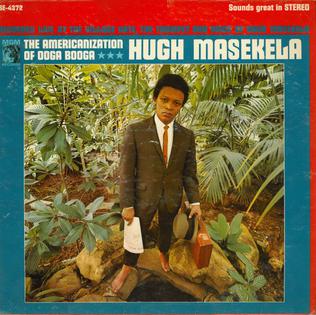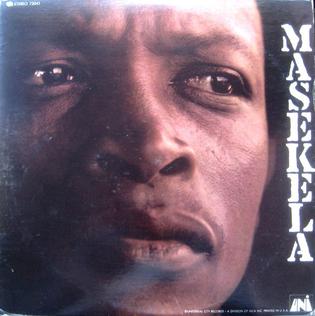
Buffalo Springfield was a rock band formed in Los Angeles by Canadian musicians Neil Young, Bruce Palmer and Dewey Martin and American musicians Stephen Stills and Richie Furay. The group, widely known for the song "For What It's Worth", released three albums and several singles from 1966 to 1968. Their music combined elements of folk music and country music with influences from the British Invasion and psychedelic rock. Like contemporary band the Byrds, they were key to the early development of folk rock. The band took their name from a steamroller parked outside their house.

Hugh Ramapolo Masekela was a South African trumpeter, flugelhornist, cornetist, singer and composer who was described as "the father of South African jazz". Masekela was known for his jazz compositions and for writing well-known anti-apartheid songs such as "Soweto Blues" and "Bring Him Back Home". He also had a number-one US pop hit in 1968 with his version of "Grazing in the Grass".

The Whisky a Go Go is a historic nightclub in West Hollywood, California, United States. It is located at 8901 Sunset Boulevard on the Sunset Strip, corner North Clark Street, opposite North San Vicente Boulevard, northwest corner. The club has been the host for musicians and bands including Taj Mahal, Otis Redding, Hugh Masekela, Alice Cooper, The Doors,The Ramones, The Byrds, Three Dog Night, The Mothers of Invention, Buffalo Springfield, Led Zeppelin, The Kinks, Love, The Stooges, Parliament-Funkadelic, Metallica, Cheap Trick, Guns N' Roses, System of a Down, The Flying Burrito Brothers, Chicago, Germs, Elton John, Mötley Crüe, Steppenwolf, Van Halen, Rush, Johnny Rivers, X, Iron Butterfly, Shark Island, Fleetwood Mac, KISS, No Doubt, Death, AC/DC, Golden Earring, Linkin Park, Nirvana, The Beach Boys, Stryper, Oasis, Everclear and Phil Seymour.

Johnny Rivers is a retired American musician. He achieved commercial success and popularity throughout the 1960s and 1970s as a singer and guitarist, characterized as a versatile and influential artist. Rivers is best known for his 1960s output, having popularized the mid-60s discotheque scene through his live rock and roll recordings at Los Angeles' Whiskey a Go Go nightclub, and later shifting to a more orchestral, soul-oriented sound during the latter half of the decade. These developments were reflected by his most notable string of hit singles between 1964 and 1968, many of them covers. They include "Memphis", "Mountain of Love", "The Seventh Son", "Secret Agent Man", "Poor Side of Town", "Baby I Need Your Lovin'", and "Summer Rain". Ultimately, Rivers landed 9 top ten hits and 17 top forty hits on US charts from 1964 to 1977.
Stewart Levine is an American record producer. He has worked with such artists as The Crusaders, Minnie Riperton, Lionel Richie, Simply Red, Hugh Masekela, Dr. John, Randy Crawford, B.B. King, Jonatha Brooke, Huey Lewis and the News, Patti LaBelle, Sly Stone, Boy George, Peter Blakeley, Joe Cocker, Oleta Adams, Killing Joke, Jon Anderson, Boz Scaggs, Womack and Womack, David Sanborn, Brenda Russell, Lamont Dozier, Curiosity Killed the Cat, Aaron Neville, Everyday People, Jamie Cullum and The Marshall Tucker Band.

Thomas Joseph Tedesco was an American guitarist and studio musician in Los Angeles and Hollywood. He was part of the loose collective of the area's leading session musicians later popularly known as The Wrecking Crew, who played on thousands of studio recordings in the 1960s and 1970s, including several hundred Top 40 hits.

Henry "Skipper" Franklin is an American jazz double bassist.

William Howard "Monk" Montgomery was an American jazz bassist. He was a pioneer of the electric bass guitar and possibly the first to be recorded playing the instrument when he participated in a 1953 session released on The Art Farmer Septet. He was the brother of jazz guitarist Wes Montgomery and vibraphonist Buddy Montgomery.

"Grazing in the Grass" is an instrumental composed by Philemon Hou and first recorded by the South African trumpeter Hugh Masekela. Released in the United States as a single in 1968, it followed United States trumpeter Herb Alpert's vocal performance of "This Guy's in Love with You" to the top spot on the Hot 100 chart, ranking it as the 18th biggest hit of the year. The song also reached No. 15 Adult Contemporary. Masekela included the song in his albums Grazing in the Grass: The Best of Hugh Masekela (2001), Still Grazing (2004), and Live at the Market Theatre (2006).

Grrr is the second studio album by South African musician Hugh Masekela. It was recorded in New York City and released in 1966 via Mercury Records. Grrr was re-released on LP in 1968 on Wing/Mercury labels as Hugh Masekela and on CD in 2003 on Verve label. On this record, he seamlessly fuses jazz ideas with the rhythmically complex South African music known as Mbaqanga.

The Americanization of Ooga Booga is a live album by South African jazz trumpeter Hugh Masekela. MGM released the record in June 1966.

The Emancipation of Hugh Masekela is the fifth studio album by South African jazz trumpeter Hugh Masekela. It was recorded in Los Angeles and released in 1966 via Chisa Records label. On this album he performs mostly his own songs. Tracks "Child of the Earth", "Felicidade", and "Ha Lese Le Di Khanna" were later included in his 2004 album Still Grazing.

Hugh Masekela Is Alive and Well at the Whisky is a 1967 live album by South African jazz musician Hugh Masekela released via Uni Records label. It was recorded live at the night club Whisky a Go Go, Hollywood, California, in 18 to 20 September 1967. The song "Up, Up and Away" was later included in his 2004 album Still Grazing.

The Lasting Impression of Hugh Masekela is a 1968 live album by South African jazz musician Hugh Masekela.

The Promise of a Future is the eighth studio album by South African jazz musician Hugh Masekela released via Uni Records label. It was recorded in March 1968 in Los Angeles, California. The album was re-released on CD in 1993 on One Way label. The Promise of a Future features Masekela's version of a famous instrumental composition "Grazing in the Grass".

Africa '68 is a studio album by South African jazz musician Hugh Masekela released in 1968 via Uni Records label. It was probably recorded in New York circa 1966 and Los Angeles circa late 1967.

Masekela is the eleventh studio album by South African jazz trumpeter Hugh Masekela released via Uni Records label in 1969.

Introducing Hedzoleh Soundz is the fifteenth studio album by South African trumpeter Hugh Masekela. It was recorded in Lagos, Nigeria, and released in 1973. The track "Languta" was later included in his 2004 album Still Grazing.

I Am Not Afraid is the sixteenth studio album by South African trumpeter Hugh Masekela. It was recorded in Los Angeles and released in 1974. Tracks 2 and 7 were also included in the 2004 album Still Grazing.

Still Grazing: The Musical Journey of Hugh Masekela is an autobiography book by South African trumpeter Hugh Masekela. It was released on May 11, 2004 by Crown Archetype. The book was written together with D. Michael Cheers. In this book, Masekela tells a story of his forty-year career in the world of African jazz and his travels from South Africa to New York, then to Jamaica, and then back to his homeland. The book is complemented by the album of the same name.



















